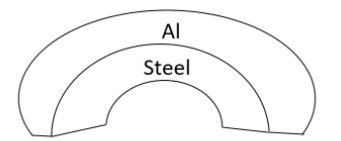
A bimetallic strip is developed of aluminium and steel $\left( {{\alpha }_{Al}}>{{\alpha }_{steel}} \right)$. On heating, the strip will be,
A. Remain straight.
B. get twisted.
C. bending with aluminium on the concave side.
D. bending with steel on the concave side.
Answer
584.7k+ views
Hint: Expansion is the common term indicating the change or increase in length. If this variation in length is along one dimension or along length over the volume, then it is known as linear expansion. Here the reason behind the expansion is the variation in temperature Therefore, it is implied that the variation in temperature will be seen in the rate of expansion. Coefficient of Linear Expansion is defined as the rate at which there occurs a change of unit length per unit degree variation in temperature.
Complete Answer:
The coefficient of linear expansion is an intrinsic property of every substance. Therefore it is different from one material to another. The rate at which a body expands completely depends on the cohesive force acting between the atoms. Cohesive force is the force which is binding two or more atoms together. In other words, the cohesive force opposes the separation between the atoms. Therefore the greater the cohesive force is, the expansion will be low for a specific increase in temperature.
As it is mentioned in the question that the coefficient of linear expansion is higher for aluminium than that of steel, we can write that,
$\left( {{\alpha }_{Al}} > {{\alpha }_{steel}} \right)$
Therefore on heating the bimetallic strip, aluminium strip will be expanded more than that of a steel strip. Because of this, the steel strip will be bending more towards the concave side.
Therefore the correct answer is given as option D.

Note:
It is sometimes in our daily life to compare the expanding ability of various materials with the increase in temperature. In general the body with a higher linear expansion coefficient is stronger in nature and this can be useful in building firm structures. These characteristics can be achieved to meet the requirements by mixing the materials. Therefore nowadays metal alloys are used commonly.
Complete Answer:
The coefficient of linear expansion is an intrinsic property of every substance. Therefore it is different from one material to another. The rate at which a body expands completely depends on the cohesive force acting between the atoms. Cohesive force is the force which is binding two or more atoms together. In other words, the cohesive force opposes the separation between the atoms. Therefore the greater the cohesive force is, the expansion will be low for a specific increase in temperature.
As it is mentioned in the question that the coefficient of linear expansion is higher for aluminium than that of steel, we can write that,
$\left( {{\alpha }_{Al}} > {{\alpha }_{steel}} \right)$
Therefore on heating the bimetallic strip, aluminium strip will be expanded more than that of a steel strip. Because of this, the steel strip will be bending more towards the concave side.
Therefore the correct answer is given as option D.

Note:
It is sometimes in our daily life to compare the expanding ability of various materials with the increase in temperature. In general the body with a higher linear expansion coefficient is stronger in nature and this can be useful in building firm structures. These characteristics can be achieved to meet the requirements by mixing the materials. Therefore nowadays metal alloys are used commonly.
Recently Updated Pages
Master Class 11 Computer Science: Engaging Questions & Answers for Success

Master Class 11 Business Studies: Engaging Questions & Answers for Success

Master Class 11 Economics: Engaging Questions & Answers for Success

Master Class 11 English: Engaging Questions & Answers for Success

Master Class 11 Maths: Engaging Questions & Answers for Success

Master Class 11 Biology: Engaging Questions & Answers for Success

Trending doubts
One Metric ton is equal to kg A 10000 B 1000 C 100 class 11 physics CBSE

There are 720 permutations of the digits 1 2 3 4 5 class 11 maths CBSE

Discuss the various forms of bacteria class 11 biology CBSE

Draw a diagram of a plant cell and label at least eight class 11 biology CBSE

State the laws of reflection of light

Explain zero factorial class 11 maths CBSE




